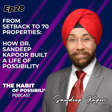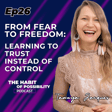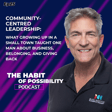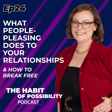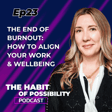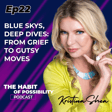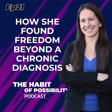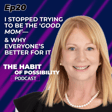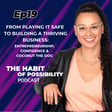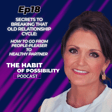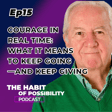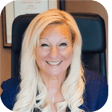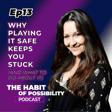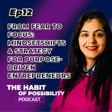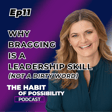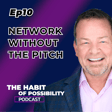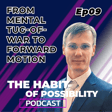Introduction to Podcast and Guest
00:00:00
Speaker
That awareness as adults on what we're doing and the intention behind the actions that we're taking are are crucial. You have to work a lot with yourself. Prepare your spirit in order to be able to be there for the children.
00:00:20
Speaker
Welcome to the Habit of Possibility podcast, the show about turning obstacles into opportunities. I'm your host, Robbie Spear-Miller. Today, our guest is Silvia Nunez Gutierrez.
00:00:33
Speaker
She is a Montessori teacher, trainer and parenting expert.
Integrating Montessori, Hypnosis, and NLP in Parenting
00:00:37
Speaker
Together, we will explore how Montessori, hypnosis and NLP can help you become a more confident parent and raise more resilient kids.
00:00:49
Speaker
Hello, everybody. Welcome to the Habit of Possibility podcast. I'm your host, Robby Spearmiller, and today we're welcoming Silvia Nunez Gutierrez, who's here to have a conversation about how we can use the Habit of Possibility with parenting.
00:01:04
Speaker
So welcome, Silvia. Thank you, Robby. Thank you very much for having me here. I feel honored of sharing this space with you, and I'll be glad to have a conversation with you.
Silvia's Journey and Montessori Education
00:01:14
Speaker
Yeah. So tell me what got you interested in helping people with parenting?
00:01:18
Speaker
I think that ever since I remember i was working as a teacher at a school, if we go a little bit backward ever since I was a child, I wanted to become a teacher. So I started first with that idea of helping children, connecting children, especially while I was ah living in Mexico.
00:01:38
Speaker
We were speaking in Spanish, but I was very interested in helping children learn English as a second language. So that's what brought me into the school system. And I was working directly with the the children, but then i started indicating a little bit more. I came across Montessori and I was fascinated about it.
00:01:57
Speaker
So I became a Montessori guide, started working at Montessori schools, and there is where I discovered that the best way to support our children was not only working as a teacher with the child, but also with the parents. Because if we were working together as a team, then things so were running smoothly. We kept that consistency, that congruency between home and school, and it worked really well.
00:02:21
Speaker
So there is where I started, you know, like reaching out to parents and giving some advice of things that parents could do at home as well to better support the children. And later on years after, life brought me to this point where I have the opportunity to become a consultant and to work with parents and with schools. So that's a little bit of of the story of where I got this idea of working closer closer to parents.
Principles of Montessori and Parenting Strategies
00:02:51
Speaker
that's great. And as you know, my kids went to Montessori when they were younger, and there are lots of things about that approach that I really connect with. And one of the things that I loved in the school was they had this picture on the wall that said, as a parent, if you are doing something for your child when they can do it for for them when they can do it for themselves, then you're in their way.
00:03:11
Speaker
And I thought that was a really great guideline for parents, right? Exactly. Your role is to facilitate them being independent and to be willing to step out of the way as soon as that's happening.
00:03:24
Speaker
And so, yeah there were many things that I observed at the school that I thought were wherere were're we're really serving the kids in some amazing ways. Exactly. I think that as parents, like everything we do or we do not do, it always sends a message to our children, you know, and whenever we're trying to to help them in the name of love or, you know, doing things for themselves, as you were saying with this quote, but we get in the middle of the way.
00:03:53
Speaker
And we send this message of you're not capable of doing things, you know. And then our children are just going to sit down and rest and say like, okay, if mommy's going to do it, why should out should I bother, you know. So, yeah, that's the beauty of Montessori, you know, that autonomously and independence that we're fostering in our children every day.
Encouragement, Independence, and Self-Guidance
00:04:16
Speaker
So one of the things that got me really interested in what I do, which is hypnosis and NLP training and basically human development and human performance, is that I knew as a young adult that there were things that I was carrying with me that weren't serving me for myself. Or if I did have kids in the future, I didn't want to pass it on to my kids.
00:04:37
Speaker
So that was a big motivator for me to get some new ways of looking at things. And i think that um for me growing up, i got it when I got attention was often when I had a problem or when I needed help.
00:04:53
Speaker
And so I started to associate love with getting help. And in some ways, I was brought up and to be very independent. But in other ways, he I had this delayed sense of being an adult or taking responsibility for myself for that reason, because I really wanted that love and attention from my parents.
00:05:13
Speaker
So I think sometimes people confuse doing things for their kids with showing them love. And the more loving thing is to help them become independent in a really healthy way. Exactly. And I think that's something that's really important in this confusion is that sometimes we want our children to become independent, but unconsciously we're making them more dependent of the adult. You know, I love talking about encouragement versus praise that sometimes we...
00:05:41
Speaker
We try to use more praise for our children and say, oh, you did a great job or, oh, I'm so proud of you you, know, and we're bringing always the attention back to us or to those final products that we're looking for instead of focusing on our children versus with encouragement. We're encouraging our children to go directly and connecting with themselves and following that inner guidance that will lead them far in the future, you know. So it's it's always a very,
00:06:11
Speaker
difficult as a parent to say, okay, like, what should I do? or Or how should I guide my children? Because I remember when I was young, as you were saying, i tend to be a little bit like the teacher pet.
00:06:25
Speaker
That's how they call it nowadays, you know, this person that is always behaving nicely and having good grades. And I was very happy when all the adults were pleased about my, and the achievements or my development at school or also at home sometimes with my mom and my dad.
00:06:42
Speaker
And that's something that and it's also influencing my behavior now as an adult. So that awareness that we can bring as well as adults on what we're doing and the intention behind the actions that we're taking.
00:06:55
Speaker
are are crucial in order to to have also some more awareness on how are we raising our children nowadays. You know, I think that's crucial. And that's something that I learned as well as a Montessori teacher.
Modeling Growth and Values for Children
00:07:08
Speaker
You have to work a lot with yourself. You have to prepare your spirit yourself. in order to be able to be there for the children. And that preparation of the spirit could take, you know, a long while.
00:07:21
Speaker
And it's not only in the classroom for Montessori or from the Montessori perspective, you have to live those values in your daily life. Because if not, there is no congruency and children can feel when you're faking it and not really modeling it through example, you know.
00:07:37
Speaker
So that's something that that, yeah, that awareness, that self-work that we have to do has become like the most important thing that that we have to consider when we are parenting.
00:07:49
Speaker
Yeah. children. Yeah, and that's a lifelong quest. and And I work with a lot of people on that self-development because as parents, if we aren't growing ourselves or challenging ourselves, then, and we're just running around in the same circle, even if that circle circles reasonably good, we're not modeling for our kids, reaching for new things, having new challenges, being willing to learn from trial and error.
00:08:16
Speaker
And your comments about focusing on the outcomes of the kids, like, you know, what they produce um versus noticing what efforts they're making or how they're growing, the key to building a really satisfying life is to take joy in the journey.
00:08:35
Speaker
Right? And to keep learning. And as we do that, the outcomes get better and better. um But, you know, I know, you know, for me, ah raising my kids, I was building this business, working a lot, and so is my he my husband was also busy.
00:08:52
Speaker
And so sometimes I think when parents are busy or or doing other things, we look for quick, easy ways to give our kids attention that may not be truly serving them.
00:09:04
Speaker
And so having the North Star be looking at where do we want our kids to be and when they grow up, are we living the kind of life we would want our kids to live? Are we modeling that for them?
00:09:16
Speaker
i think is a good starting point. But I think some people, and including myself, I've done this where we'll do things for our kids out of guilt or to make up for things or just to spend time with them, but the things we do aren't necessarily serving them.
Positive Discipline and Family Values
00:09:30
Speaker
Exactly. And I think that all the parents that in the world go through this phase of fear, insecurity, and guilt, because sometimes, as you're saying, we become very busy, or we're, you know, focusing on our attention on something else, because we are also humans. We're also persons. We're also, you know, wanting to develop and try new things in our life. It's not that you become a mom or a dad, and then you have to stop everything else.
00:09:54
Speaker
Everything and life will continue, but now you're having this different role. And having that clarity of the North Star. I love how you said it. You know, having that vision of where you want to go, it's going to keep keep you as well calm and centered and grounded on the values and the things that you want to bring, you know, to your your home to foster in your family culture as well.
00:10:19
Speaker
So one of the things that have helped me a lot to to get into my child's eyes or to see things through the perspective of my children ah has been ah something called positive discipline, because that's something that ah has brought me a lot of insights on how to connect with our children and how to create this sense of belonging and a safe and respectful community in our houses or, well, schools or wherever you you are working with children.
00:10:51
Speaker
And what I love about it is that it provides you experiential activities, experiential moments where the parents can communicate and also share ideas with other parents, and but also moments where they can act as children so they can see and, you know, also shape their own thoughts based on that perspective that the child is having.
00:11:14
Speaker
And for me, that was something that was like an aha moment when i was doing all these activities in my positive discipline training, because I was like, oh my God, this is how my kids are feeling. So I could see things from that perspective as well.
00:11:28
Speaker
And there were many things that that were tying up with my ideas of, oh, I'm maybe not spending a lot of time with them. I'm maybe not seeing this or that. But there were many other things that my kids were getting by me being a busy mom, ah you know, working out there in the world. Because it was also this aspiration that they were seeing in me.
00:11:47
Speaker
Or I could see how all the routines that I was instilling at home, all the habits, all the... then and the things that I was trying to run every day were impacting as well and in their own motivational aspirations in life.
00:12:02
Speaker
So it is a very complex, as you were saying. Parenting sometimes can't be really easy. But when you have a clarity of where you're heading, everything there else starts also like accommodating in a better place.
00:12:15
Speaker
Yeah, and knowing that they're eating and sleeping and breathing how you're living. And so the the probably the most powerful thing you can do as a parent is to make to improve your own life. And none of us are perfect. We can all always improve. We all have our days or our moments.
00:12:33
Speaker
um But see if you're on that path and you're you're genuinely looking to expand your yourself and ah your skill at dealing with the world or dealing with people um or whatever it is that matters to you, your kids will learn how to live that way as well.
00:12:50
Speaker
Exactly. And now that you were saying that we're not perfect, absolutely not. I love a phrase from positive discipline that it's have the courage to be imperfect. You know, in everything you do, just have the courage to be imperfect and model children how everyone is going to make mistakes in life and how those mistakes are amazing opportunities for us to keep on learning and to keep on growing.
00:13:13
Speaker
And if we embrace a mindset where mistakes are seen as opportunities to grow, our children are going to have that mindset as well. You know, it's also called like the growth mindset, not from Carl.
00:13:25
Speaker
It invites children to to keep ah being motivated of moving forward and with all the resources that they have and knowing that everything that they do not know know or do i do not have right now, maybe it's not available yet.
00:13:39
Speaker
but that they can develop in that direction if that's something that they're interested in. the same happens with us as parents. We can also you know keep on learning and renewing and renovating ourselves in order to become the parents that we really want to be for our children.
00:13:54
Speaker
Yeah, and in the hypnosis and NLP world, what we say is there's no such thing as failure, there's only feedback. And I get to see all the adults who grew up feeling a sense of shame with making mistake and all the problems it causes for them in their life.
00:14:10
Speaker
So if we can raise kids from a young age to be really confident about trial and error learning, um it's a huge gift to give them for their future.
00:14:21
Speaker
Exactly. And I think that's why I still going back to Montessori, I fell in love with its philosophy because that's what Montessori as well brings to the children, that opportunity to learn from mistakes and to con construct their own knowledge based on the experiences that they are living.
00:14:38
Speaker
And knowing that they are capable beings of doing amazing things, that we just have to give them the opportunity and that they can keep on developing at their own pace if we allow them to to have that, you
Guiding Children Towards Independence
00:14:50
Speaker
know? Yes, yes, we are totally on the same page.
00:14:54
Speaker
It's like we do the same thing in different ways. Yeah, yeah, that's what I love about hypnosis. I think that you were introducing it to me, and I was surprised of all the commonalities that Montessori and hypnosis have.
00:15:08
Speaker
yeah So, yeah, I'm fascinated every time that I speak with you about it. yeah And I'm learning so much as well in this ah road top of, you know, personal and professional growth as well. Well, you know, currents are their they' children's most powerful hypnotists.
00:15:23
Speaker
ah So it's important to learn to use that skillfully with your kids. I completely agree. It's important to have to put a and bring that awareness, you know, to raise it and and to be very conscious of the things that we're saying or not saying or why are we saying those things or sending those messages or acting in a certain way or not with our children. Mm-hmm.
00:15:48
Speaker
Yeah, yeah. Another thing I loved about the Montessori school my kids went to is that when the teachers needed to discipline the kids, they would look at the child and imagine them 10 years down the road and they would choose what response they had to the child's behavior based on that 10 year outcome.
00:16:06
Speaker
And so I love that long view ah of not just seeing you know the specific thing the child just did, but really keeping that in mind so that they're able to to help this child learn what they need to learn in a powerful way.
00:16:20
Speaker
Exactly, and I think that circles back to the North Star that you were talking before, you know, having this idea of where I want to see my kids 10 years away from now. Where do I want to see them in the future? Like, which ones are the life skills that I want my child to have or to develop in those years?
00:16:37
Speaker
And something that I love in Positive Discipline that we use specifically for this is that we can start seeing all the challenges that our children are presenting nowadays as opportunities for us to instill those life skills that we want them to have in the future, you know? So if a child, i don't know I remember when my kids were very young and I have one of them making a big tantrum and, you know, the really wanting or crying because he wanted a toy or something like that, and I was saying no because that wasn't the time for my child to get it, I remember having this clear direction of saying this is going to be a teachable moment.
00:17:17
Speaker
This is going to develop one of the skills that I wanted to see in my child, you know, that patience, all that and respect as well on how we ask, how we don't ask.
00:17:28
Speaker
And then I was able to to stay centered and to stay grounded and to deal with that moment OK, I see I was validating feelings. I see how much you want to have this story right now.
00:17:40
Speaker
I know that it is frustrated when things are not turning our way in life. So I was doing all that validation and still it's not the time to have the toy today.
00:17:51
Speaker
You know, so that powerful and word that we have in between that is and instead of but makes a lot of difference as well in in how we're worthing things for our children.
00:18:03
Speaker
And again, it's helping us to see all these moments or of of of challenge or all these difficult situations that are arising as valuable opportunities for us to develop those life skills that we want to see in them in the future.
00:18:17
Speaker
Yeah. My sense is that a challenge a lot of families have these days is that um the way our culture works or how most kids are raised our isn't necessarily a useful way to raise children. But there's this peer pressure either from other parents or the kids saying, you know, other kids get to do this or that.
00:18:37
Speaker
And so especially when parents are busy or they're worried about their ability to be a good parent, they might fall for that kind of pressure and and resort to doing things that might seem easier, or more socially acceptable in the near term, but aren't actually serving that child in the long run.
00:18:56
Speaker
So what has your experience been with that? I think that it is really difficult to compare yourself to other families because other families that have different values in place, have different cultures, and we need to realize that each family is a different ah places, a different set of values and systems in their places.
00:19:15
Speaker
So again, I'm going to sound a little bit repetitive, but when we have that North Star, what is important for my family? Which ones are the three most important values that we as a family have?
00:19:28
Speaker
And we try to follow and to act according to them. then it's easier to know where are we heading. Even though if my kids' friends are doing things that I feel that they are not age-appropriate, I'm not going to be likely to fall into those influences if I have a clear vision of which ones are the values and the things that we do in our family.
00:19:48
Speaker
And that's the the easiest way as well to set up and those boundaries with your children. And, you know, having clear agreements of what are the things that are... and feasible doing in our family, what are the things that we do not accept in our family, and then it's easier for us to to relax. Like a very simple example, it's like having dinner.
00:20:11
Speaker
Some families love having dinner all together every weekday and also during the weekends. Some families do not place a lot of value in in that situation. They might get together after dinner or after work and play a board game.
00:20:27
Speaker
And that's the time that they consume all together. Some families will do it over the weekend. Some families prefer doing it during the weekdays. So each family is going to be different and nothing is wrong or right.
00:20:37
Speaker
Mm-hmm. certain aspects and certain behaviors and certain routines work for each specifically, for each family. You know, there's no rule of one simple thing working for everyone.
00:20:51
Speaker
So I think that it's going back to that idea of having a clear vision of the values and the culture that you want to instill in your family in order to be able to do not fall.
00:21:01
Speaker
for those influences that are going to come there. Because nowadays, and especially with technology, we are over-informed of everything that's happening, and we have plenty of information available for us as parents, which can make things sometimes even more confusing.
00:21:19
Speaker
Because now it's like, okay, this lady is saying that this is working magic for her. And this daddy is saying that. at of front And I'm doing everything. You know, the opposite. It's like, what are we doing now?
00:21:30
Speaker
So, yeah, it could be a lot of information out there. But again, when we bring it back to basics, it's back to having that clear vision.
Trusting Internal Wisdom and Overcoming Information Overload
00:21:39
Speaker
yeah of where you want to get, of having that awareness of the values that you want to instill in your family, on the aspects that you need to work as an adult as well to overcome the challenges that you have been carrying from the past in order to be able to to be there and to better support the children in our lives.
00:21:58
Speaker
Yeah, so it's honoring the art of parenting because everybody's going to do it differently and every family has their own, you know, constellation of things, right? We're were on the whole solar system here a thing with stars and constellations. Absolutely. But to really respect that and be confident in that, I think, helps a lot because, you know, I remember when my kids were younger, we especially when my older son was a baby, he was not a good sleeper.
00:22:24
Speaker
ah he was a brutal sleeper. Oh, my i So i he woke me up every two hours for his first two years. And so I was really tired. And I would read these books saying he's going to have behavioral problems, he's going to have developmental problems because of this.
00:22:39
Speaker
And so I felt terrible. I felt like, oh, my God, I'm hurting my child. And my pediatrician gave me the best advice. He said, know that everybody who wrote a book about that was staking their career on a career on it and just do what you have to do.
00:22:54
Speaker
And that that was really good advice because especially when things aren't going well or there's a problem, it's easy to to resort to grabbing onto like a technique or one person's opinion or the latest book on something, which sometimes might be helpful, but we really have a problem with too much information.
00:23:13
Speaker
I do. And I think that we all have our inner wisdom. We are very resourceful persons. And that inner thing that is going to tell us what is right or not for our children.
00:23:25
Speaker
Because as you were saying with your kid, I'm so sorry to hear that you had to wake up. Yeah, it was fun. It was fun. For a long time, because and for me, it was completely the opposite. You know, my kids, ever since they turned two months old, they were on a four hour schedule. So they were like eating, you know, every four hours.
00:23:45
Speaker
And during night, they were falling asleep at 10 and then they will wake up until six. Right. But I also had all these books and lectures saying like, you have to feed a child every four hours, no matter if they're sleeping. So then I was still questioning myself, oh my God, should I wake up my child or not? or what should I do?
00:24:06
Speaker
And thank God also my pediatrician was amazing. And he said like, okay... Imagine you're sleeping in and the middle of the night, you know, you're in that deep cycle of sleep. And all of a sudden, I wake you up with a big plate of food and I tell you, hello, time to eat.
00:24:23
Speaker
You're going to be opening your eyes and say like, ah what are you talking about? It's not the right time. And he was telling me that, that's the same with your child. If your child is sleeping, let him sleep. Nothing is going to happen. He is developing. He is growing.
00:24:37
Speaker
And you can see that, and you know, month by month when I was taking my children to the pediatrician, everything was going well. So I'm like, okay, no concern. I should stick to my own routine because I see that it's the best for my child.
00:24:50
Speaker
Maybe not for other kids, but for my children, it was working and I should kept on going, you know. but yeah So again, each family, it's completely completely different one from the other.
00:25:01
Speaker
And we as moms or as parents have that internal thing, that sixth sense, if I would say, about knowing, you know, what your children need or not at specific moments. sometimes you know when you're saying yes to something whenever will you fall for that cultural pressure and that you say yes you can do this and then oh my god you feel that hunch in your stomach saying like oh maybe this is not a good idea and you know that has happened to me and I'm being very honest with my children and just saying you know what I think I said yes because everyone was saying yes to it but in the end I think that maybe we're not ready for that You know, maybe let's create a plan in order to get ready to that moment.
00:25:48
Speaker
It could be something as riding a bike to school. You know, all children started riding bikes to school. And my kids right now are 10 and 12 years old. ah So especially when it happened with my son, i was like, oh, know. know if you're ready for that, but mommy, everyone else is doing it. And he was extremely excited at about it. But I was like, ah okay, let's take baby steps on it. You know, first, why don't we go on a weekend and we write together.
00:26:14
Speaker
So like that, we create a plan. We see the road. I see how are you developing? I can see if you're ready or not. And based on that, later we can take a decision. But without making a plan, without, you know, going along the route with my child, I wasn't ready for saying that yes. Yeah. So it depends on each family. And I think that that honesty and that inner ding that is telling you what's right or wrong with our children, it's really important. And and we have to truly listen to it.
00:26:45
Speaker
And so what guide is a great example of stepping into your child's shoes, just like imagining what what it's like for them if you wake them up when they're in a deep sleep and try to...
Supporting Children's Goals and Removing Obstacles
00:26:54
Speaker
Put some food in their mouth.
00:26:56
Speaker
um You're able to step into their world and actually see the relationship between where they're at and what they want to do. so you can build a bridge for it. and You can help them build a bridge to it instead of simply following rules that are external rules or pressures.
00:27:12
Speaker
Exactly. And also creating your own rules, like with the bike, you know, it was like, okay, this is what's happening there. Instead of just jumping there directly, I could also see and step in the shoes of my child saying, okay, I am an 11 year old. i want to ride bike with my kids, with my friends, sorry, because everyone is doing it. So I could also see ah where was this coming from and saying, okay, what can I do in order to help him feel successful and to see if he's ready.
00:27:40
Speaker
Maybe he is and he surprises me and then things are going to be all right. Maybe he's not and we need to keep on riding the bike more often during the week the during the weekend. So so yeah, it was nice ah it was a nice surprise for me as well to give him the opportunity of teaching me how ready he was for for taking this challenge.
00:28:00
Speaker
And it also came back to that inner ding and saying, okay, I did the right thing because now I'm confident. I saw him in action. I know that he's capable of doing things and riding the bike by himself. And then I am allowing him to do it, it which it would be completely different if what if I just said, yes, yes, you can go. And we never had a plan. And I would always have this, you know, humped on my stomach saying like, oh, maybe he's not ready. Maybe it's not the right thing.
00:28:26
Speaker
Yeah, yeah. Well, it's interesting because in the work that that we do here with hypnosis and NLP, it's all about helping people come back to their selves. So if you imagine there's the sun and then there's clouds in front of the sun, those clouds might be the influences they had growing up or anything difficult they went through and how they coped with it.
00:28:48
Speaker
that may or may not be useful in their life now. So I know for me that was true. When I started to learn this, I knew there were clouds in front of my son, I didn't know how to get rid of them, right? I didn't know how to let them float away.
00:29:00
Speaker
And so the work we do is helping people discover that, too. If you didn't grow up with a model of how to parent your child well, because you weren't parented well for various reasons, right? There are, you know, sometimes parents have health issues. Sometimes they grew up in ways that you know, they're going to parent you the way they were parented and maybe their parents didn't really have a mature way to parent them.
00:29:23
Speaker
um So there are lots of different things that could be in the way of being open and being able to tune into what you really want for your kids. um So it's wonderful to see people grow through that so that they they learn how to trust themselves to make those choices. Yes. Exactly. I think that trust is crucial. And again, as you were saying, i think that no one has been raised the perfect way because no one is perfect. You know, even if your parents were there with you 100% of their times, that will also bring...
00:29:56
Speaker
some consequences in your life, you know? For sure. Raising that awareness all of where you are, what were the things that you had in the past or you received or didn't receive, and then with that awareness, start tracing the path.
00:30:12
Speaker
that you want to create, it is amazing, you know, just to to bring back all this awareness on on giving those steps very, very intentional and looking forward to that North Star that you were talking before. I think that I love the analogy that you're saying of the sun and all the clouds. I think that all of us have those clouds and everything that is
Intentional Parenting and Emotional Awareness
00:30:37
Speaker
there. You know, in Montez-Ru, we call that also like cosmic education.
00:30:40
Speaker
Yeah. You know, it's finding your place in this universe. What are you contributing to the universe and how everyone else in the universe is also contributing towards you.
00:30:52
Speaker
So when you see things from that perspective, you can also see that you're not alone. Because sometimes as parents, we can also feel alone and trapped in our own challenges and saying like, oh my God, what am I going to do? This is only happening to me. But when you start, you know, creating these and communities where you can relate to other parents, when you can talk to other parents, when you can share your challenges and you realize that you're not the only one, then it's like a big relief. It's like saying, oh, okay, I can do this thing.
00:31:25
Speaker
And if we connect it not only to other people, but to everything else in nature and everything else in the world, it's like if everything is working in that perfection and with their cycles, then we can also start looking into our own cycles.
00:31:41
Speaker
And understanding a little bit more our emotions and also the way in which we are responding instead of, ah you know, reacting with our children. Like it's always better to to have that that kind of control in how we want to intentionally respond rather than just having emotions all over the place and reacting in every challenging situation that our parenting journey is is bringing in.
00:32:06
Speaker
Yeah, for sure. And i think one key skill as a parent is to learn how to look at what is in the child's best interest, because sometimes all of us as parents get caught up in what we need or the challenge we have at the moment or the feelings we're feeling.
00:32:23
Speaker
And so to be able to um be aware of that and manage that well enough that we can actually take action in relation to what that child needs is a big deal.
00:32:35
Speaker
And I think that that's ah an area that a lot of people really appreciate learning how to do better. and And it's easier for the children to actually trust the parents to lead them when they know children's sense if discipline or feedback or whatever's happening is coming from a place that's in their interest versus in the parents' interest they just know.
00:32:58
Speaker
Yes, yeah and that's true. And if we're all honest, we can admit that there are times where maybe we were not responding to them based on their interests, but our interests. Absolutely. So the more we can build that muscle, the easier it is for us to build this this relationship where the child will actually um learn what they need to learn.
00:33:19
Speaker
Because we're playing that temporary role of guiding them so that eventually they can guide themselves. And if they can't trust their guide, then they have a problem. um and And so I see a lot of that with adults because they if they don't trust their own guidance, they end up in a lot of debate or running from one thing to another or not trusting anything in the world and ending up lost.
00:33:43
Speaker
um So it can have really big impacts on people's lives. Yes, absolutely. That trust, it's it's crucial for everything else to develop, you know. And sometimes when we are talking about that preparation that we need to have with ourselves in order to move forward, it's also important to consider that we are always, always as parents trying to do our best with the resources that we have at our hand at that time, you know, because sometimes these guilt,
00:34:11
Speaker
this this blaming, this shaming, it's coming along the way saying like, oh my god, what did I do? How come did react in that way instead of doing this or that? And it's like, okay, when you forgive yourself for things that have happened in the past and you understand that you were trying your best with the resources that you have at hand at that time, then things are getting a little bit lighter.
00:34:35
Speaker
And it's easier for you to start looking into a new path, into a new direction, and then keep on developing everything that you need in order to build that trust and to become that guide for your children. I love that you were using the terminology of guide because that's exactly what we do in Montessori. In Montessori, we do not have Montessori teachers.
00:34:56
Speaker
When you're graduating, you become a Montessori guide. Because that's what we want. We want to guide our children into the life skills that we were talking before. we want to become those guides. And as parents as well, I think that's one of the most difficult jobs, that we're guiding our children and to live life ah where they do not depend on us, where they can be independent, where they can be successful by their own means.
00:35:23
Speaker
And that means as well getting away from mommy and daddy. And sometimes we are the ones that are scared about that to happen. And that's why unconsciously we are doing behaviors that make our children even more dependent on ourselves instead of letting them, you know, be free and raise and walk their own paths.
Mistakes as Feedback and Parental Emotions
00:35:45
Speaker
And, you know, when people get caught up in guilt or shame, it makes it very hard to learn because from a subconscious point of view, those are awful feelings. And so people just want to get away from the whole situation or they're trying to resolve it in a really intense way where they're needy for a resolution, which usually doesn't lead to good learning. And so, you know, we we look at it as, you know, what the behavior was, would be either useful or unuseful, and we can change it.
00:36:15
Speaker
But we don't want it to look at it as a reflection of who we are as a person. So we we help people learn how to do that. a lot of people don't know how. But as a parent, if you're caught up in any form of guilt and shame, your kids will also learn how to feel guilty and feel shame as they grow up.
00:36:33
Speaker
And those are really unhealthy places to be, and they make it really hard to um grow into the person you want to be. and That's true. And whenever we have that awareness, again, I always joke with, ah you know, teachers and parents that we as parents have like a Wi-Fi connection with our children.
00:36:50
Speaker
So everything that we're experiencing, everything that we're feeling is being passed on directly to our children, even if we want it or not. You know, as a Montessori guide in a classroom, it would look like, you know, when you're entering the class and it's very chaotic and everyone is loud and they're running and they're not listening.
00:37:09
Speaker
And all of a sudden you realize like, oh my God, yes, I'm feeling anxious today. I am not where I wanted to be. I didn't leave all the problems that i had you know at the door of the school.
00:37:20
Speaker
I'm still thinking about it. I'm still bringing that energy to the classroom. And that is transferred to the students. So as soon as you as a teacher start you know gathering yourself and calming down, you can see how the energy of the children start also you know like reacting to that energy that you're sending out to the universe. And I think that for parenting, it's ah it's kind of the same. If we get stuck in certain emotions or certain patterns, those emotions and those patterns are going to be repeated by our children.
00:37:53
Speaker
and And that's why I think that the work that you're doing with parents, it is amazing. Because you're helping them to get to work with that nitty-gritty, you know, those those things that we as parents try to avoid, that we do not want to look at them, we don't want to connect with them.
00:38:09
Speaker
But just by opening those boxes and healing those emotions, and it's going to be a way in which we can become more powerful. as well as parents, because then we're going to get in control of it instead of having fear of those big emotions. And by consequence, we're going to show our children a way out of those emotions.
00:38:30
Speaker
Because if we feel trapped sometimes when we are filled with shame and guilt, that's the same way in which our children are dealing with shame and guilt. But if we find a way out of it,
00:38:41
Speaker
And we model our children that way later on in life. It's going to be easier for them as well to move forward. yeah So that's the magic power that we have and the magic connection that we have with the children in our life.
00:38:57
Speaker
One of the, yes, and and one of the things I find really awesome is that kids are so flexible. So even if you mess up, if you move on to do it better, they'll pick up on the better part things.
00:39:10
Speaker
And so there are a lot of chances to have a redo or to grow and learn and become better as a parent and trust that your kids will just, they'll go with that. And and that's a you know are I think, a really powerful thing, and it helps people to make peace with whatever they've done in the past and see that we need to focus on what needs to happen next.
00:39:32
Speaker
Exactly. in In positive discipline, we have ah one activity specifically for parents that is recovering from mistakes. How to recover from mistakes and how to make amends.
00:39:43
Speaker
with our children because yes, we're all human. We're all going to go through all those curves of emotions and we're going to be upset sometimes and we're going to lose it in front of our children, you know. But then what's after that?
00:39:55
Speaker
Should I leave it just there and never talk about it and then teach my children that that's okay to feel uncomfortable and then to avoid conflict in the future? Or should I go and talk about it?
00:40:06
Speaker
You know, um when you recognize that your own mistakes as well as parent and and you come and you say, you know, I shouldn't have raised my voice like that. I was coming out of work and I was extra busy thinking and all the things that I have still to work on.
00:40:22
Speaker
And I think that's why ive raised my voice when you asked for that. So I am so sorry that I did that.
Humor, Connection, and Self-Regulation
00:40:30
Speaker
I am going to try to control myself so the next time that this happens, well, this situation arises, I'm going to not raise my voice in front of you.
00:40:40
Speaker
And then we can also come up with agreements. Is it okay that whenever I'm coming back, if I'm a little bit stressed and you want to talk about a specific situation, can I make just one sign for you to know that maybe it's not the right time to talk about it and then we can talk about it after?
00:40:57
Speaker
And then you can turn it into um a fun moment with your children because you can come up with that with a specific sign. It could be something as like this or, you know, very, very common or it could be something silly.
00:41:10
Speaker
Like, okay, we're going to do like three taps, one, two, three, and then I know. And then when the my child has made these signs, when, you know, I'm very kind of busy or something, I'm there and I'm trying to remember the sign and do it for my child.
00:41:25
Speaker
it It throws me out of that bad mood I was engaged with, you know, because whenever you bring that fun into life, things can get transformed. So sometimes just by doing like this, it's like, okay, I remember I'm now at home. i am with my children. I want to connect with them. So then it's easier for me just to say, okay, I let go of everything. Okay, I'm here for you.
00:41:49
Speaker
Yeah. Let's talk about it, you know. Yeah, awesome. Yeah, yeah. Well, we say change physiology first, right? So if you want to change how you feel or your mood, you want to move your body and then the other person will pick up on how you're feeling.
00:42:04
Speaker
So if you really learn how to choose how you're feeling, then you can influence the situation in a much more powerful way. Yeah, and I love that you're talking about that because, as you know, those mirror neurons that we have in our brain are going to be useful for learning and absorbing everything that is around us. So the same as children are going to start following us if we're moving in a certain way, children are going to start self-regulating themselves if we're modeling as parents how to self-regulate.
00:42:35
Speaker
And that takes us back to the importance of working in ourselves and knowing where we are and what are the things that we want to improve in order to keep on becoming that parent that we want to be for our children.
00:42:50
Speaker
You know, in order to to have a clarity of of that North Star that we want to get to. Yeah, great. Well, thank you so much. i think there were so many great insights today.
Collaborative Parenting Workshop Announcement
00:43:01
Speaker
And Sylvia and I are planning on doing a parenting workshop in the fall. ah so we will put information in the podcast notes. You can learn more and join us.
00:43:11
Speaker
And we've chosen to collaborate because we've seen so many commonalities in how we look at things. So we thought if we brought our two skill sets and expertise together, we could offer you an even more powerful experience.
00:43:25
Speaker
It's going to be wonderful. And I think that this journey is going to be insightful for everyone that will be participating. And yeah, I think that all these skills are going to help us feel more empowered as parents and a little bit more grounded in the needs that we have to cover in order to become better for our children.
00:43:45
Speaker
Yeah, our children and our children's children and everybody in their lives. Generations to come. Going back to that big picture of how the scope of all of the actions that we take today.
00:43:58
Speaker
We have an exciting announcement. Sylvia and I are offering parenting workshops for those who want to grow as people and parents. Check out the link in the show notes to learn more and register.
00:44:10
Speaker
You can also connect with Sylvia at theloveseedconsulting.com. If you're interested in connecting with me and learning about personal and business coaching, consulting, and training opportunities, go to mindlinkconsulting.com or hypnosistrainingcanada.com and schedule your free consultation.
00:44:30
Speaker
Let us know what you think of the show. Reach out to us at mindlinkconsulting.com. And if you like this show, please rate and review us so other people can find us too. Thanks so much for tuning
Conclusion and Invitation to Opportunities
00:44:42
Speaker
in. I'm Robbie Spearmiller, the host of the Habit of Possibility podcast.
00:44:46
Speaker
Tune in next time to learn more about how you can turn obstacles into opportunities and make the most of your life and career.


